Connecting
Psychology Department Alumni Newsletter:
Special Issue on Alumni Panel Discussions of Career Paths
Issue #2 Winter 2020
On November 13, 2019, a crisp day deep into the fall, the Department of Psychology and Psi Chi invited three alumni, Claire Hopkins, Travis Whitaker, and Steve Dendrinos, for a panel discussion of their career paths. Approximately 40 students and six faculty filled a classroom in Au Sable Hall to hear what these former Psychology majors had to say. Claire, Travis, and Steve talked about their experiences as Lakers and what they have done since their graduation. They also answered students’ questions and spoke to their concerns. Each of them was thoughtful and articulate. Together, they provided many insights for current students who are in the process of plotting their own paths and for faculty who are looking for ways to more effectively help their students prepare for their futures.
Alumni are in a great position to offer unique perspectives that can benefit our current students and we greatly appreciate what these three alumni did to support students who are in midst of figuring out their personal career paths. They took time out of their busy lives to share their experiences with us—Travis drove all the way from Chicago for the event. Our students and our department truly appreciate their generosity of time, spirit, and energy, and the messages they conveyed. We devote this issue of our alumni newsletter, Connecting, to feature each of these three panelists and some of what they had to say to our current students.
We asked the panelists to think about several questions regarding their career paths and current positions before participating in the panel. Most of what follows comes from their written responses to those questions.
[1581827520].jpg)
Claire Hopkins
Graduated in December 2015, with a major in Psychology and a minor in Sociology.
[1581826883].jpg)
[1581827618].jpg)
Claire described her career path following graduation:
My story may be a little different than other graduates in the field due to chronic pain I experienced throughout my life and the treatments I was going through for this. (Claire credited Professor Mary Bower Russa, among other Psychology and Sociology professors, for their understanding and encouragement as she pursued her education while undergoing treatments for chronic pain.) First, I think it is important to share that I did not anticipate graduating due to my health, let alone holding a full-time job in my desired career. That being said, I accepted a part-time job at Helen Devos Children’s Hospital as a Behavioral Health Technician.
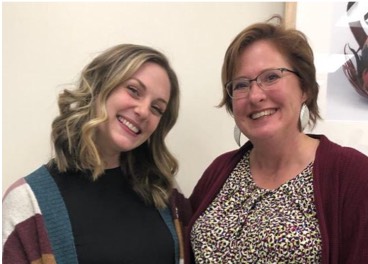
After gaining experience in this direct-care position, I accepted a job at Relief After Violent Encounter as a Volunteer Coordinator. This was a new position where I had the opportunity to create a volunteer program that met the needs of the organization and, most importantly, the survivors we serve. After around a year in this role, I then transitioned to my current position as a Children’s Counselor where I am honored to provide supportive counseling and advocacy services to children, and their mothers, impacted by domestic and/or sexual violence. I have been committed to serving survivors and am so thankful that I have a job that has a mission I am so passionate about.
The primary duties of her current position include:
- Providing individual and group crisis-intervention based counseling and safety planning for children and adolescents who have been affected by domestic and/or sexual violence, both as outreach survivors and survivors living in our Safe House;
- Providing case management and advocacy services ranging from the legal/criminal justice system, schools, community mental health services and other community referrals; and
- Collaborating with and presenting to community agencies, schools, and organizations on the dynamics and impact of domestic, dating, and sexual violence.
Claire explained that having a bachelor’s degree in a human services field was an important credential in obtaining her current position. She felt her involvement with the GVSU Women’s Center and Sexual Assault Advocates provided her with some understanding of domestic and sexual violence and made her a better job candidate, as did the Bystander Intervention Training she completed at GVSU.
We asked the panelists about the main challenges and rewards of their current positions. Claire said:
The main challenges are truly the content of my work and the reason I provide the services I do. It is very challenging to work with abuse survivors as it can create secondary trauma. Additionally, working for a non-profit in the social services field comes with a smaller pay-scale and longer, more taxing workdays, often with limited funding which means staff usually wears more than one hat. Therefore, having a healthy support system and setting personal boundaries is necessary to be a successful advocate in this field. On the flip side, the reward completely outweighs the challenges. It is an amazing feeling to watch a survivor find their voice and to regain control that an abuser stole. Additionally, I love being able to create awareness and invite others to join the movement to end violence and believe survivors. I love working with the teen population and encouraging them to seek out healthy relationships and identify warning signs early on. I am thankful for my job and thankful to the survivors that so bravely invite me to be a part of their healing journey.
Claire also spoke to how the chronic pain she has long experienced has been difficult, but how, in the long run, it has resulted in positives as well:
As previously shared, my chronic pain journey has absolutely shaped my path. It has been a very long journey through countless doctors, medications, treatments, procedures etc. The pain has affected my physically and mentally and has created challenges. However, it has also allowed me to write a new narrative about myself. Not only have my personal experiences made me stronger and resilient, but they have also provided me with an empathetic yet powerful lens that guides me to successfully empower the survivors I work with.
We asked each of the panelists the following question: Is there anything you know now that you wish you had known when you were a student? Claire said:
Yes, I wish that I would have known that it is OK to follow your own path. It’s OK to learn differently, to ask for help, to be different from the crowd. Oh, and it’s OK to change your mind, to try and even to fail. Don’t give up, don’t let anyone take away your worth, listen to your body and mind and be present with yourself. For example, I was under the impression that if I did not immediately continue on to a master’s or doctoral program, that my psychology degree was useless, and that is completely not the case. That being said, would I like to go back to get my master’s and be able to provide therapy services, absolutely; however, I would not change my decision to gain hands-on experience and utilize my bachelor’s degree before considering going back. For me, this would not have been a smart choice and may have continued my negative narrative that I wouldn’t be able to have a full-time job simply due to the fact that school was incredibly challenging for me and a master’s program may have been too much for me, immediately, with my health battles. Now, I have proof that I am capable of working full-time, and in a challenging field where I am a confident, proud advocate who gets to choose when moving on to the next step is appropriate for me and my life journey.
Travis Whitaker
Graduated in the Spring of 2012 with a Psychology major and an Applied Statistics minor
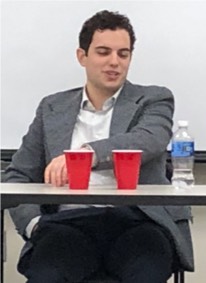
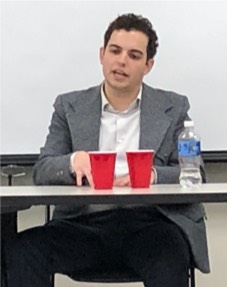
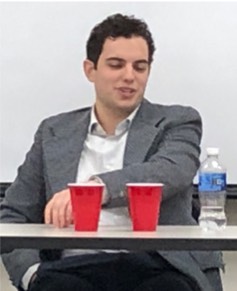
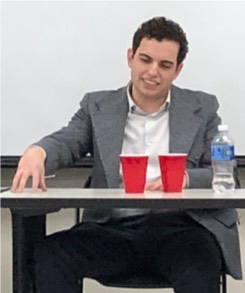
This is Travis’s career path since graduation:
- Worked at Pine Rest for a year and interned as a researcher for a non-profit in Muskegon
- Completed master’s Program in Psychological Research at Montana State University between Fall 2013 and Spring 2015
- After graduate school, worked as a market research analyst in the design studio at Haworth in Holland, Michigan (designed “dashboards” or infographic sheets that compiled market and industry data on our product applications)
- In 2017, accepted position with a pharmaceutical marketing agency in Chicago (tracked market performance for advertising campaigns across the world for some of the largest pharmaceutical companies)
- In 2019, accepted position as the Data Management and Research Specialist for the Arthroscopy Association of North America (AANA)
He describes his current responsibilities:
In my current position as a Data Manager and Research Specialist at the Arthroscopy Association of North America (AANA), I have taken on two interesting challenges, both of which enable me to work with some of the top orthopedic surgeons in North America. The first challenge I’ve faced is redesigning the way my team teaches Arthroscopy to surgeons. When I joined AANA, my primary focus was helping to design a new methodology which requires surgeons to pass structured phases of training (using statistically validated benchmarks). Only when the surgeon passes all phases will they achieve the desired certification. My team has since been asked to deploy our methodology throughout the country. Furthermore, we want to identify where surgeons are struggling in our course and couple the results with patient outcomes databases to identify patterns and improve our courses.
In my second, but equally important project, I am working with government agencies such as the Department of Defense to track patient outcomes (i.e., soldiers) for deployed military orthopedic surgeons. We are investigating the impact of arthroscopic courses taken between deployments on skill retention and procedural success rates.
As for educational experiences that had a major impact on him, Travis said:
The research I completed in Dr. Brian Lakey’s and Dr. Wolfgang Friedlemeier’s labs helped me to create a basic to intermediate understanding of empirical research. The one-on-one time and guidance was, and continues to be, something bigger universities certainly do not offer. The letters of recommendation I received from these two mentors were key components of my acceptance into graduate school in Psychological Research and later, my professional opportunities in the business sector.
Dr. Bowdle ran a Psych Film Series while I attended GVSU that I thoroughly enjoyed attending each Wednesday night. That was an artistic outlet that helped to balance out the science of my psychology classes and the math of my statistics classes.
When asked whether there is anything he knows now that he wishes he had known when he was an undergraduate student, he had two pieces of advice to offer current students:
Use this time to develop a work ethic. Even if you are struggling in your classes, if you are working hard then you will be learning and growing as a person. I would say GPA is less important than the professional relationships you build while in undergrad, as well as the projects you complete, research or otherwise.
Use this time to start understanding yourself. One of the best pieces of advice Dr. Lakey gave to me was to take my core curriculum classes within the psychology department and then use my elective courses outside of the psychology department. This advice led me to courses that taught me meditation, basics of personal finance, a knowledge of the Great Lakes, and a writing proficiency I would have never reached without the GVSU writing department. I am uncertain I would have found many of the interests I have today without the variety of courses offered at GVSU.
Steven Dendrinos
Graduated from GVSU in 2006 with a Psychology major.
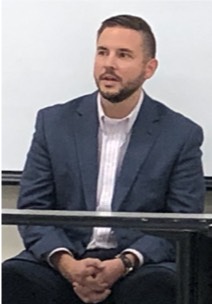
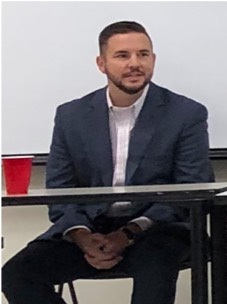
Here’s an overview of Steve’s career path:
- While completing course work at GVSU, worked at Pine Rest as a mental health technician on a variety of different inpatient psych. units, with a primary focus in the Child and Adolescent space.
- At Pine Rest, transitioned to clinical informatics to help psychiatrists, psychologists, social workers and nurses advocate for electronic tools to promote behavioral health; collaborated to develop Trinity Health’s strategy for behavioral health documentation in Cerner (the electronic health record vendor).
- Took a position at Spectrum Health in clinical informatics; a major goal was reducing physician “burnout.”
- Enrolled in GVSU’s Executive MBA program, a joint effort between Spectrum Health and GVSU.
- Current role is Director of Health Informatics at Spectrum Health.
Steve told us that obtaining an MBA, specifically, was not required to advance to his current position; however, having or pursuing some sort of advanced degree was necessary. In his current role, one of Steve’s primary duties includes the responsibility for Electronic Health Record Training for all physicians, advanced practice providers, residents and students at Spectrum Health in both the inpatient and ambulatory settings. He also oversees Pharmacy Informatics. His work involves “helping to bridge the gap between the technical and clinical” realms of medical practice. How does his work accomplish this? He says:
Our team does this through ongoing Electronic Health Record (EHR) governance, working with clinicians and technicians to establish standards and drive adoption of national best practice. We ensure clinicians’ needs are met through the electronic tools we offer; we ensure they are aware of ongoing changes related to the HER; we ensure that clinicians are engaged in the decision-making process.
Steve spoke to the rewards of the job:
The greatest reward is seeing the impact the team makes on a day-to-day basis. We help providers solve problems every day. Sometimes that’s through basic troubleshooting, sometimes it’s through large-scale initiatives such as our new program aiming to decrease the documentation burden on clinicians. One of my team’s favorite things to hear is, “you just saved me so much time every day,” allowing providers to spend more time focusing on the care of their patients.
He also spoke to ways in which his time at Grand Valley affected him in the long term:
GVSU provided a great learning environment – specifically, the availability of professors and their level of involvement in the classroom. This isn’t the experience for students at all academic institutions – it differentiates GVSU from other universities and it allows students direct access to thought leaders in the field
The lessons I learned across all of the psychology courses I took have continued to pay dividends over the course of time – whether that is in the business environment or at home with my young children and wife. I think about broad lessons like learning to challenge the status quo, better understanding how to critically analyze research/business findings and better understanding the delicate balance of mind, body and spirit.
And, as for advice to current students, Steve said:
There are opportunities out there to take advantage of your psychology degree right now. I wasn’t exposed to the opportunities at Pine Rest, for example, until I began doing my own research. The fourth largest behavioral health provider in this country is just south of town. They offer internships, entry-level positions and beyond through hospital-based services, outpatient therapy and residential services, among others. This is a great way to gain exposure to professionals in the field, whether psychiatrists, psychologists, social workers nurses or administrators.
You don’t need to pursue a terminal degree in the field of psychology in order to apply what you’ve learned. The critical thinking, knowledge and desire to help others that you’ve developed as you’ve completed your coursework will prepare you to be successful, whichever field it’s in. I think this is generally known by most, but most of us didn’t grow up knowing what we were going to be – a doctor, a nurse, a psychologist, a lawyer. That’s ok! Give yourself some grace. Embrace the ongoing evolution of the things that interest you, the things that you’re good at, and the opportunities that present themselves because you’re in a constant pursuit of challenging yourself to become a better version of yourself.
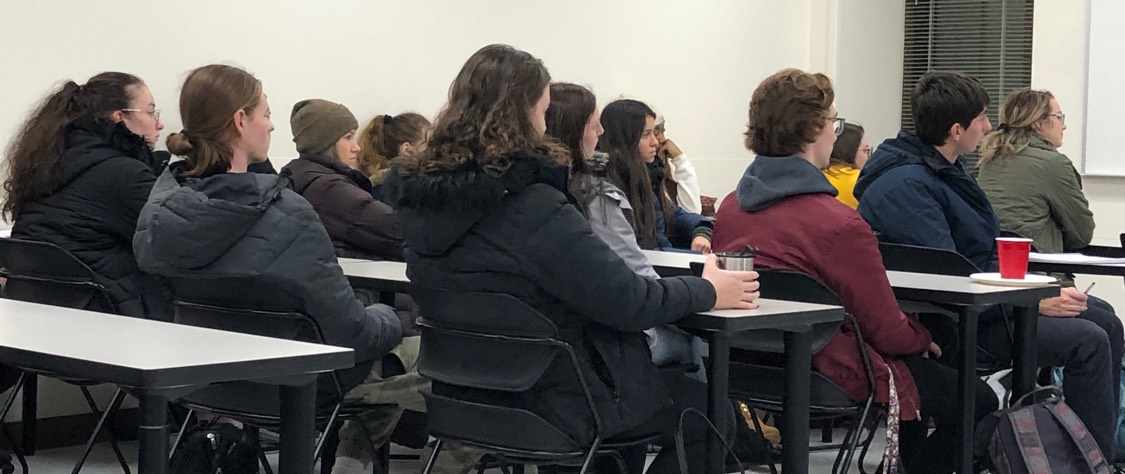
Here are what our current students are saying about the panel discussion:
Liam Hart, Psychology Major, Sophomore
I thought the discussion was really good. I'm not sure what I would change about it. For me, the best part was how the alumni were easy to relate to since they were in our place as an undergrad not long ago. One thing I wished they talked about more was the process of getting internships while attending Grand Valley or during the summer, but hearing how their careers began to develop after graduation cleared up a lot of questions and confusion I had.
Rebecca Saur, Psychology Major, Senior
The alumni panel was a great event to learn more about the wide range of job opportunities in the field of psychology. Today, it seems that graduate school is almost expected in order to find a “good” job, so hearing about individuals who have found success without advanced degrees was great! I was also appreciative of the time afterwards where students were able to talk one-on-one with the panelists. That was a great opportunity to ask some more specific questions and get their feedback, while also making connections. I’m so glad I went!
Afterword
We’re glad to share with you just a little of what these former Psychology majors told us about their lives since graduating from Grand Valley We hope that maybe it’s sparked some memories for you or given you a chance to reflect on your own paths since graduation.
Again, we’re so grateful for the opportunity to get in touch with former students and to hear about your lives. Hearing what these three panelists had to say was inspiring and helpful for all of us, students and faculty alike.
Given the success of this first Alumni Panel Discussion, we would like to organize similar events in the future. Please contact us if you are interested in returning to campus to talk to our students. We are sure they would love to hear from you!
Also, we’re always happy to hear from you if you have any feedback about the newsletter or anything else to share with us.

